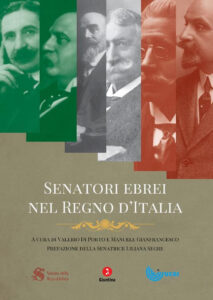BOOKS – Jewish Senators,
44 stories of people who made Italy
 Forty-four figures – from Ugo Ancona of Ferrara to Alessandro Lustig Piacezzi of Trieste – show the relevant contribution that left a mark in the events after the unification of Italy in 1861, at least until the fascist regime’s antisemitism marked the most infamous of caesuras, in a dramatic breakthrough for Italian Jews. Presented at the Salone Internazionale del Libro in Torino, the book Senatori ebrei nel Regno d’Italia (Jewish senators in the Kingdom of Italy) arose from a common purpose of the Italian Senate and the Union of the Italian Jewish Communities to shed light on some of the protagonists of that historical period, on individual life trajectories and on the challenges several of them faced when the notorious racial laws were promulgated in the autumn of 1938.
Forty-four figures – from Ugo Ancona of Ferrara to Alessandro Lustig Piacezzi of Trieste – show the relevant contribution that left a mark in the events after the unification of Italy in 1861, at least until the fascist regime’s antisemitism marked the most infamous of caesuras, in a dramatic breakthrough for Italian Jews. Presented at the Salone Internazionale del Libro in Torino, the book Senatori ebrei nel Regno d’Italia (Jewish senators in the Kingdom of Italy) arose from a common purpose of the Italian Senate and the Union of the Italian Jewish Communities to shed light on some of the protagonists of that historical period, on individual life trajectories and on the challenges several of them faced when the notorious racial laws were promulgated in the autumn of 1938.
Edited by Valerio Di Porto and Manuele Gianfrancesco and with a preface by Holocaust survivor and senator for life Liliana Segre, the volume published by Giuntina deals with some of the Italian senators who went down in history and reached senior positions of responsibility, such as Isacco Artom, Salvatore Barzilai, Luigi Luzzatti and Alessandro D’Ancona. So far, scholars were not particularly interested in other less known figures, even though a lot of them “would have deserved it,” as stated by the director of the Foundation Center for Contemporary Jewish Documentation – CDEC Gadi Luzzatto Voghera in the introduction to the volume, which contains essays providing us with useful information that helps to contextualize the senators’ work.
Among others, jurist Massimiliano Boni presents an overview of the Kingdom of Italy by describing the origin, the social and cultural background, the political orientation and some of the activities Jewish senators carried out. On the other hand, Di Porto focuses on Italian Fascism, from the beginning of the dictatorship to the implementation of antisemitic laws. Gianfrancesco deals with the transition from monarchy to republic, as Italy, free from Nazi-fascism, embarked on a strenuous march to rebuild from the rubble. In fact, even in this matter Jews stood out for their contribution.
Introducing the editorial project are some reflections by Senate President Ignazio La Russa and UCEI President Noemi Di Segni. Starting from the past, the present is also discussed. “The Senate of the Republic is and will always be at the forefront in the fight against any form of discrimination, racism and antisemitism, which cannot and must not exist in our country anymore,” writes La Russa, reminding how today institutions must reiterate that “equality, freedom, respect and democracy are the key principles to which we all want and must adhere.” Values also recalled by Di Segni, who notes in her text, “The senators elected or appointed today are the demonstration of a regained freedom, sanctioned by a constitution we are all called to protect.”
Translated by Francesca Pischedda and revised by Chiara Tona, students at the Advanced School for Interpreters and Translators of the University of Trieste, trainees in the newsroom of the Union of the Italian Jewish Communities – Pagine Ebraiche.
